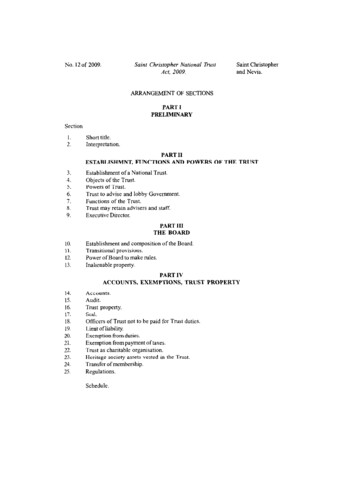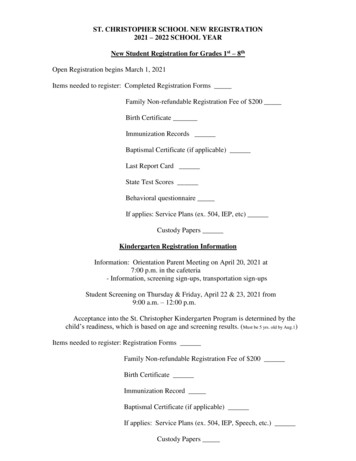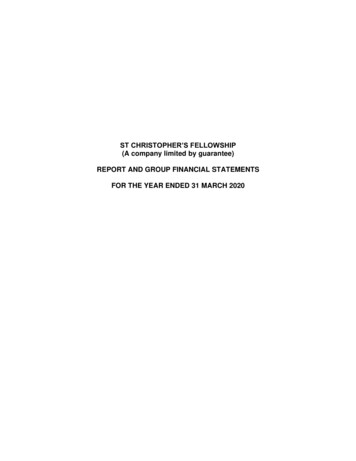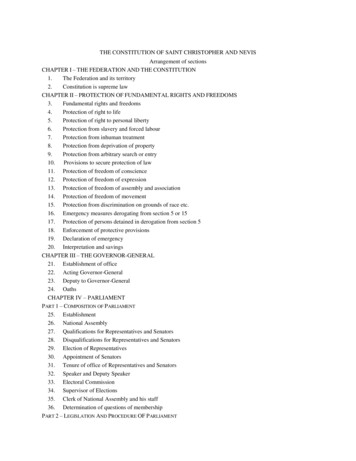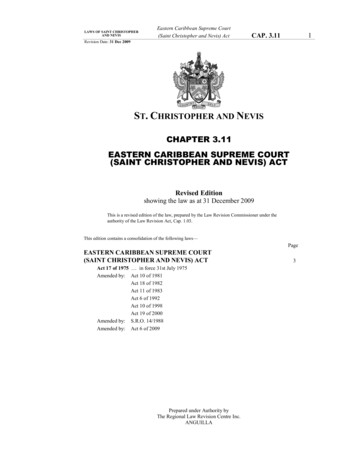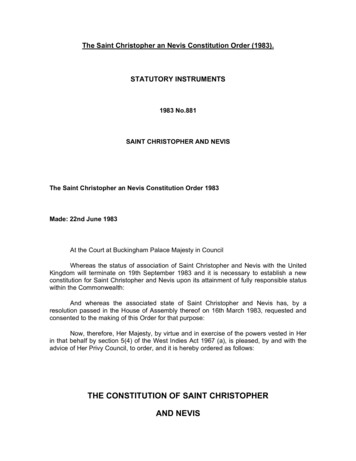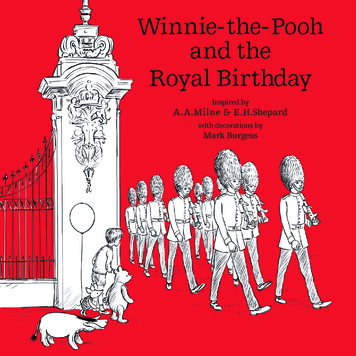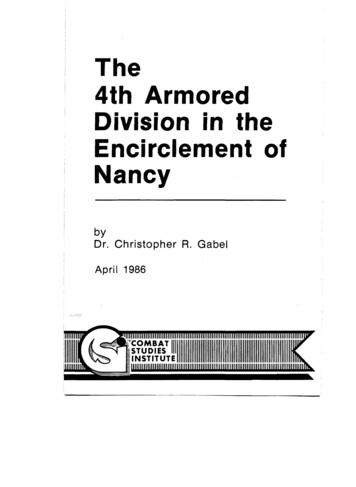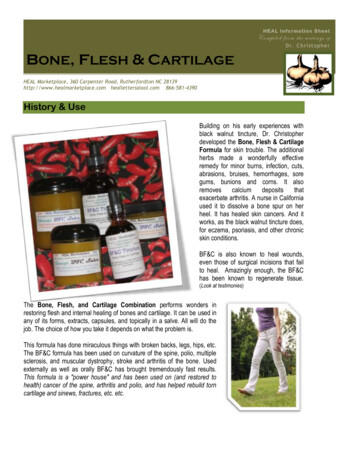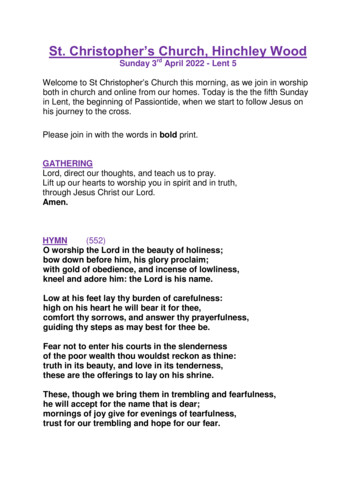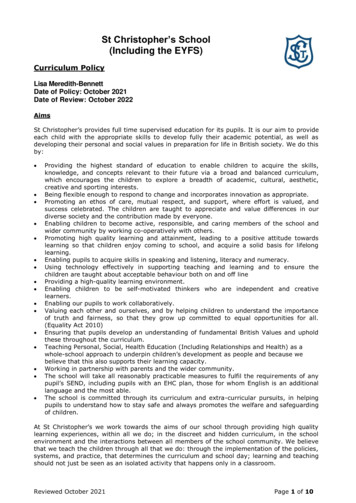
Transcription
St Christopher’s School(Including the EYFS)Curriculum PolicyLisa Meredith-BennettDate of Policy: October 2021Date of Review: October 2022AimsSt Christopher’s provides full time supervised education for its pupils. It is our aim to provideeach child with the appropriate skills to develop fully their academic potential, as well asdeveloping their personal and social values in preparation for life in British society. We do thisby: Providing the highest standard of education to enable children to acquire the skills,knowledge, and concepts relevant to their future via a broad and balanced curriculum,which encourages the children to explore a breadth of academic, cultural, aesthetic,creative and sporting interests.Being flexible enough to respond to change and incorporates innovation as appropriate.Promoting an ethos of care, mutual respect, and support, where effort is valued, andsuccess celebrated. The children are taught to appreciate and value differences in ourdiverse society and the contribution made by everyone.Enabling children to become active, responsible, and caring members of the school andwider community by working co-operatively with others.Promoting high quality learning and attainment, leading to a positive attitude towardslearning so that children enjoy coming to school, and acquire a solid basis for lifelonglearning.Enabling pupils to acquire skills in speaking and listening, literacy and numeracy.Using technology effectively in supporting teaching and learning and to ensure thechildren are taught about acceptable behaviour both on and off lineProviding a high-quality learning environment.Enabling children to be self-motivated thinkers who are independent and creativelearners.Enabling our pupils to work collaboratively.Valuing each other and ourselves, and by helping children to understand the importanceof truth and fairness, so that they grow up committed to equal opportunities for all.(Equality Act 2010)Ensuring that pupils develop an understanding of fundamental British Values and upholdthese throughout the curriculum.Teaching Personal, Social, Health Education (Including Relationships and Health) as awhole-school approach to underpin children’s development as people and because webelieve that this also supports their learning capacity.Working in partnership with parents and the wider community.The school will take all reasonably practicable measures to fulfil the requirements of anypupil’s SEND, including pupils with an EHC plan, those for whom English is an additionallanguage and the most able.The school is committed through its curriculum and extra-curricular pursuits, in helpingpupils to understand how to stay safe and always promotes the welfare and safeguardingof children.At St Christopher’s we work towards the aims of our school through providing high qualitylearning experiences, within all we do; in the discreet and hidden curriculum, in the schoolenvironment and the interactions between all members of the school community. We believethat we teach the children through all that we do: through the implementation of the policies,systems, and practice, that determines the curriculum and school day; learning and teachingshould not just be seen as an isolated activity that happens only in a classroom.Reviewed October 2021Page 1 of 10
We believe that: Learning should be a rewarding and enjoyable experience for everyone i.e. learningshould be fun and enable children to make expected or accelerated progress. Teaching needs to equip children with the skills, knowledge and understandingnecessary in order that they can play an increasingly useful and positive role in societyand make informed choices about their lives both now and in the future. High expectations of learning behaviours are evident through explicit teachermodelling.School staff will support the aims of the school through: Promoting positive relationships between all members of the school community(children, staff, parents, and governors). Providing a secure, stimulating environment where all children are supported inresponding to the challenges involved in moving towards and then reaching their fullpotential. Providing a broad, balanced, and engaging curriculum, this is appropriatelydifferentiated according to the needs of all children. Addressing issues of entitlement to ensure equality of opportunity for all children. Rewarding children for all the good things they do both in school and in the widercommunity. Promoting a positive self-image whereby children are encouraged towards a sense ofresponsibility for themselves and others. Providing the skills that encourage children to become confident, independent learnerswhere children know they sometimes have choice. Providing impartial and non-stereotyped guidance and support to our pupils. Wherepossible visitors, some of which will challenge stereotypes, will be invited in to inspireand motivate our children. Offering a curriculum with a robust understanding of safeguarding through thecomprehensive PSHE and e-safety programmes.Children will support the aims of the school by: Attending school with a positive attitude, eagerness to learn and to behave in a waythat allows themselves and others to learn. Working well independently and collaboratively; remembering what they have learntand having the confidence to apply skills and knowledge in new contexts. Persevering with their learning and knowing that when they find it difficult, they canask for help. Taking pride in their work, always trying their best and aiming to progress all the time.Organisation and PlanningWe plan our curriculum on a 3-year cycle to ensure the teaching and learning at StChristopher’s remains fresh and exciting, for both the teachers and the children. This isreviewed annually to ensure progression of learning across the year groups, and termly topicsare confirmed or identified for each year group. Each term a medium-term plan is devised,and we are developing a long-term plan to ensure coverage of key skills, knowledge, andprogression. Weekly planning enables the learning to be differentiated, to meet the needs ofall children, including those with SEND, EAL and the most able. Weekly planning is evaluatedand given to the Headteacher. Subsequent planning will be modified where necessary toensure the needs of all learners is being met.Reviewed October 2021Page 2 of 10
All medium-term/long-term planning is saved on the shared staff network in:StaffAll Planning 21-22Teachers will: Plan lessons effectively which take children’s prior learning and current assessmentinto account and are appropriately differentiated in order that the lessons consolidate,build upon and extend learning for all children. Insist on high expectations of learning and social behaviours. Ensure that effective direction and support is given in order that the children make atleast good progress. Demonstrate secure subject and pedagogical knowledge in to inspire children and buildtheir understanding. Apply a range of teaching styles, which appropriately match the children’s learningstyles in to sustain their concentration, motivation, and application. Develop and sustain good links and focussed communication with parents/carers in tosupport the children’s learning. Develop and maintain inspiring classroom and learning environments. Effectively assess and monitor children’s progress in order that they can extendchildren’s learning both within individual lessons and over time. Use resources effectively, including other adults, to support children’s learning. Use technology effectively to support children’s learning. Use questioning successfully to gauge and extend children’s skills, knowledge andunderstanding. Be reflective regarding their professional practice and seek CPD opportunities whennecessary to equip themselves with the skills, resources and knowledge needed inorder to provide the children with the best possible learning experiences both in classand when undertaking interventions.Sharing the Curriculum with ParentsAt the beginning of each academic year the parents of each year group are invited in to meettheir child’s class teacher and to find out about the curriculum for that year group. They willalso find out about the structure and organisation of their child’s day, week, and term. Thisgives the parents an opportunity to ask any questions they may have. Each term a PreNursery Information Evening is held.In the Spring TermEarly Years CurriculumThe teaching and learning in Nursery, Pre-Reception and Reception are based on‘Development Matters’ and ‘Birth to 5 Matters’, where the ‘Characteristics of EffectiveLearning’: Playing and Exploring Active Learning Creating and Thinking CriticallyAre intertwined with the ‘Prime areas of learning’: Personal, Social and Emotional Development Communication and Language Physical DevelopmentReviewed October 2021Page 3 of 10
and the ‘Specific areas of Learning’: LiteracyMathematicsUnderstanding the WorldExpressive Arts and DesignThe early Years Curriculum is devised so that all children can access teacher led learningthrough guided activities. The children will then be able to develop their skills andunderstanding through self-initiated learning from planned activities set up by the teacher.They will also sometimes choose their own learning and decide upon the direction it takes.The teachers and key workers will also adapt planning and follow the children’s own lines ofenquiry. There will be a balance of structured activities and child-initiated play withopportunities for learning both indoors and outdoors. The EYFS curriculum includes specialistMusic, PE and French.Key Stage 1 CurriculumThe curriculum we teach in Year 1 and Year 2 is based on ‘The National Curriculum’ but is notdefined by it. The pupils have a broad and balanced curriculum with plentiful opportunities foractive and personalised learning, both independently and collaboratively. The children aretaught an ongoing programme of: PEArtMusicDesign and TechnologyREPSHE (Including Relationships and Health)French.The children in Year 2 also have lessons in Philosophy.Each subject area has a subject leader, who will provide a strategic lead and who will offersupport and advice for colleagues related to the subject. Part of their role is to review thesubject policy.Music, PE, Computing and French are taught by specialist teachers and Philosophy is taughtby the Headteacher.Reviewed October 2021Page 4 of 10
AssessmentOn-going formative assessment is at the heart of St Christopher’s. This enables us to supportthe children in deepening and strengthening their learning, understanding and development.Children in Years 1 and 2 will also have end of term test in Reading and Maths to offersupport to teacher assessments. It also gives them the opportunity to ‘practise’ assessmenttests in readiness for 7 entrance exams.(See Assessment Policy)Work ScrutinyWork scrutiny will take place to look at standards in teaching and learning, monitor markingand ensure differentiation and progression is in place for all. Work scrutiny alongside planningwill also highlight the range of teaching and learning styles being used effectively within ourschool.Recording and Reporting Attainment and ProgressReception and KS1Autumn Term- Parents Evening (Standards Windscreen), Year 2 Repots for 7 Spring Term- Parents Evening (Standards Windscreen), Literacy and Maths targets givenSummer Term- Formal School Report (Standards Windscreen), Literacy and Maths Targets,Reception Early Learning Goal report and invite to come and discuss the reportNursery and Pre-ReceptionAutumn Term- Parents EveningSpring Term- Parents EveningSummer Term- Formal School ReportAt St Christopher’s we operate an ‘Open Door Policy’ where the parents may meet theirchild’s teacher or Headteacher by appointment, or informally at any time.Learning Journeys and BooksKS1The children in KS1 have a range of workbooks and folders to demonstrate theirunderstanding and learningNursery, Pre-Reception and ReceptionThe children in Nursery, Pre-Reception and Reception have a ‘Learning Journey’ whichhighlights their learning path through guided work, and independent work. The children inReception also have a ‘Ready for Writing’ book that shows their attainment and tracks theirprogress in writing.All children have a St Christopher’s book which begins in Nursery and continues through toYear 2. This contains photographs of special events e.g. trips, school productions, Houseevents and special days (Maths, Environment, Book, Science etc.). It may also containsamples of work and includes a drawing of themselves annually to track progress in drawingskills.Reviewed October 2021Page 5 of 10
HomeworkNursery and Pre-Reception- mini challenges and questions posed via Evidence Me (onlinePlatform). In the summer term Pre-Reception take home reading books and library books.Reception- Reading books are changed three times a week, key words weekly. Weekly homelearning set on Seesaw. Show and Tell are created via Seesaw (online platform)Year 1 and Year 2- Reading books are changed daily, key words if still needed weekly,weekly homework over the weekend varying the subject week by week, weekly spellings tolearn for a test.Year 2 have a October half term homework pack sent to support the Year 2 7 tests whichwill take place at the end of the Autumn Term.In addition, as well as the above homework children are asked to learn lines for classassemblies and Christmas and Summer shows. Year 2 will have additional lines for specialevents such as Harvest Festival, Christingle, and leavers assembly.We have an annual poetry competition where every child in school takes part. The childrenare asked to learn an age appropriate poem over the February half term holiday in readinessto recite in front of their class.Online Learning Platform for Home Learning in response to Covid-19Nursery and Pre-Reception- used Evidence Me as their tool to provide home learning witha mixture of teacher led phonics/maths/physical videos and activities for the children toaccess, alongside daily stories and welcome videos from their teachers.Reception, Year 1 and Year 2- In response to the Covid-19 pandemic Seesaw was set upand successfully used as a home learning tool for Reception, Year 1, and Year 2 during thenationwide lockdown. Each year group were provided with online learning covering all areasof the curriculum, with teachers recording videos and setting a range of activities each day.All learning was responded to via interactive marking. Seesaw will continue to be used forReception, Year 1 or Year 2 children who need to isolate for set periods of time at home dueto track and trace requirements. This will be continually reviewed alongside governmentguidance.Seesaw will also be used as a Parental Engagement Tool in Reception and as a platform forHomework in Years 1 and 2. The IT specialist may use Seesaw to record children’s learningduring specialist lessons.Fundamental British ValuesAt St Christopher’s we recognise that we have a part to play in actively promotingFundamental British Values (FBV). Pupils learn respect for British values and the rule of lawtogether with the principles of democracy and free speech.We will achieve this by: Democracy- our School Council introduces the children to the concept of a democraticvote as each class votes for their own class representative. All opportunities to discuss‘voting’ are seized and discussion using turn taking, a show of hands and a paper voteare used in a variety of class-based activities, Year 2 Philosophy lessons andReviewed October 2021Page 6 of 10
assemblies when appropriate. A questioning approach is encouraged in all lessons aswe aim to build the good citizens of the future. Rule of Law-in the Autumn Term, each class produces a personally produced set ofClass Rules that lie concurrently alongside whole school rules. These enable the ClassTeacher or Key Worker to draw the child’s attention to their agreed, devised rules inthe event of any transgression and to reinforce the collaborative approach for rules tobe followed. A positive approach to good behaviour and learning is recognised andcelebrated by the whole staff, using House points, stickers, Merit Assemblyrecognition, visits to the Headteacher and Secret Letters home. Individual Liberty- part of the ethos of St Christopher’s is a focus on providingopportunities to increase each child’s confidence in their own abilities and self-esteem,and this is reflected in both our PSHE curriculum in KS1 and PSED in the Early Years.Our children are confident to discuss their feelings and responsibilities, in relation tounderstanding freedom and happiness for all. This takes place in a range of situations,for example, in the playground, Year 2 Philosophy lessons and throughout oureveryday curriculum. Mutual Respect and Tolerance- weekly assemblies begin in the Autumn Term eachwith a different theme, often linked to how different cultures (e.g. Greeks, Christian,Jewish, Aborigines) make sense of the world. Children are introduced to the notionthat all beliefs are to be valued, questioned and discussed rather than acceptedwithout consideration. Visitors with a range of beliefs are invited in, to talk to thechildren. We believe in challenging stereotypical roles and strive to invite visitors, suchas a female paramedic and a one-armed pianist who challenge stereotypes.Spiritual, Moral, Social and Cultural DevelopmentWe are aware of our role to promote and support the growth of our children’s spiritual, moral,social and cultural development. A healthy questioning approach in all areas of the curriculumis developed by encouraging enquiry and debate. This is achieved through a variety of ageappropriate and meaningful ways including: Discussion- Time to Talk, circle time, partner talk, School Council, Peer Assessment,Philosophy, PSHE and assembly.Assemblies- featuring stories read and shared, short video clips and personaltestament from visitors such as our local vicar, community nurse, charityrepresentatives such as Pong Tek and MERU, Scientists, Engineers and the local police.Rewards- house points, stickers, merits, secret letters home, cup awards, lunchtimesupervisor awards, good manner awards (e.g. Kindness Kangaroo, Polite Penguin),Wows (from home and school), poetry competition certificates and prizes, Sports Daymedals and stickers, House Day prizesEnrichment- trips to a variety of settings such as The Baitul Tafuh Mosque, StMartin’s Church, Sri Raja Rajeswari Amman Temple in Stoneleigh, Polka Theatre,Kidzania, Bourne Hall Remembrance Garden, Langley Vale tree planting, The Barbican,St Pauls Cathedral and tea with the local mayor at the Town Hall.Personal, Social, Health Education (PSHE) including Relationships and Health (RHE)We teach Personal, Social, Health Education as a whole-school approach to underpinchildren’s development as people and because we believe that this also supports theirlearning capacity.The Jigsaw Programme offers us a comprehensive, carefully thought-through Scheme of Workwhich brings consistency and progression to our children’s learning in this vital curriculumarea.Reviewed October 2021Page 7 of 10
Jigsaw covers all areas of PSHE for the primary phase including statutory Relationships andHealth Education. The table below gives the learning theme of each of the six Puzzles (units)and these are taught across the school; the learning deepens and broadens every year.TermAutumn 1:Puzzle (Unit)ContentBeing Me in MyIncludes understanding my own identity and how I fit well inWorldthe class, school and global community. Jigsaw Charterestablished.Autumn 2:Spring 1:CelebratingIncludes anti-bullying (cyber bullying and homophobicDifferenceincluded) and understandingDreams andIncludes goal-setting, aspirations, who do I want to becomeGoalsand what would I like to do for work and to contribute tosocietySpring 2:Healthy MeIncludes Health Education, self-esteem and confidence aswell as healthy lifestyle choices, sleep, nutrition, rest andexerciseSummer 1:RelationshipsIncludes Relationships Education, understanding friendship,family and other relationships, conflict resolution andcommunication skills, bereavement and lossSummer 2:Changing MeCoping positively with changePhysical, Mental Health and Emotional Well-beingWe actively promote the physical, mental health and emotional well-being of all our pupils.This is achieved daily, weekly, and termly in several ways including: Show and Tell sessionsTime to talkFriendship flowersCircle timePositive praiseSpotty Box initiative- children share home achievements e.g. gymnastics, piano, BluePeter badgesWeekly Merit AssemblyWeekly Headteacher AssemblyInspirational visitors -(Previous visitors have included Olympic Gold medallist TomRansley and female horserace trainer Laura Mongan)Visits out of school to allow our pupils to contribute to society - (Previous visits haveincluded Harvest Festival at St Martin’s church, Year 2 visit Linden House to talk to andsing to the elderly residents, carol singing in Epsom).Year 2 participate in the Digital Citizen Award.Weekly Assemblies Merit Assembly- class merits, spotty box, Mathletics achievementsThemed Assembly- story, moral/messageLibrary Raffle- Themed library books to go home each weekHouse points- weekly winners celebratedReviewed October 2021Page 8 of 10
BirthdaysChild led Class Assemblies with parents invited to watch½ termly assembly to launch new Jigsaw TopicEqual Opportunities and SafeguardingThe curriculum at St Christopher’s is designed to ensure equal opportunities for all learners,regardless of ability, gender, ethnicity, religion, or disability. As a non-selective school, weoffer learning support via a SENCO and ensure the needs of all learners are met, including themost able through differentiation of learning activities. Within our curriculum, we build inopportunities for our pupils to understand safeguarding issues, which may affect them, and toensure they feel safe and supported at school. Our PSHE (RHE) curriculum affordsopportunities to be responsive to issues as they arise, and E-Safety awareness is taughtthroughout the curriculum and particularly within the Computing Curriculum. Through thecurriculum, pupils are taught to express their opinions with confidence, feeling secure in theirenvironment that is actively promoted with the children from when they first start at StChristopher’s. They are taught to respect and value the opinions of others, even though theirown opinions may differ, and to listen and take turns speaking. All pupils are taught the valueof tolerance and how to deal with playground situations which they may feel are unfair orunkind to them.We aim to provide an environment in which pupils are valued, fulfilled, confident andemotionally secure and to foster courtesy, respect, tolerance and understanding. Each pupil isvalued as an individual within a supportive shared community – they are encouraged todevelop into resilient learners who aim high and can think independently.English as an Additional Language (EAL)We maintain an EAL register, which is updated annually. Across the school, there is a smallpercentage of children for whom English is classed as an additional language, as defined bythe DFE, though most would be considered fluent in English. Our annual cohort compositiondetermines what extra facilities and activities we will incorporate into the classrooms andenvironments. Where a pupil has English as an additional language and in the rare event thatthey need specialist teaching to develop appropriate fluency, parents will be guided andsupported in finding such support outside school, as well as being advised of the support theschool can provide.Linked policies: Assessment More Able SEND EAL PSHE (RHE) Safeguarding and Child Protection Equal Opportunities E-SafetySignedK. ParkMrs K ParkChair of GovernorsSignedA C ThackrayMrs A C ThackrayHeadteacherReviewed: October 2020Next Review: October 2021Reviewed October 2021Page 9 of 10
Reviewed October 2021Page 10 of 10
At St Christopher's we operate an 'Open Door Policy' where the parents may meet their child's teacher or Headteacher by appointment, or informally at any time. Learning Journeys and Books KS1 The children in KS1 have a range of workbooks and folders to demonstrate their understanding and learning Nursery, Pre-Reception and Reception
